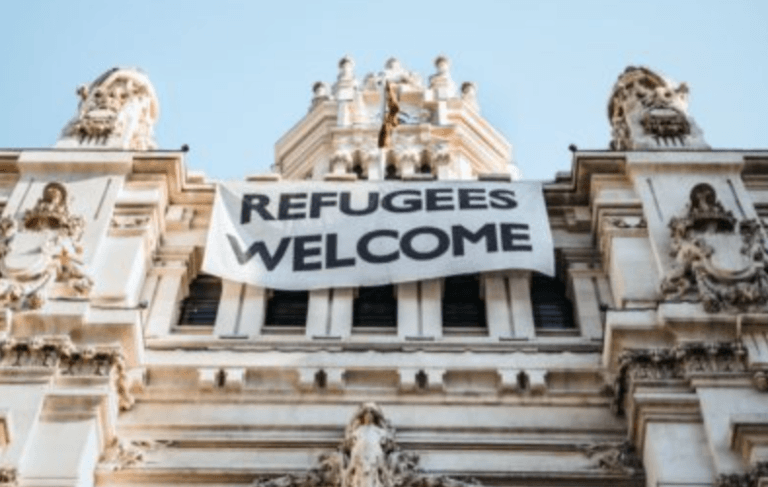A reflection by Jenny Yang
You probably saw the images of strollers parked at train stations in Poland, left behind by Polish families who were eager to help newly arriving Ukrainian refugees. In a news story by NPR, Polish young adults have shared how the war in Ukraine has forced them to reevaluate their career choices and “everything I do in my life actually.” As a country welcoming the largest number of Ukrainian refugees in recent months with open arms, the Poles have been a testament to how welcoming refugees doesn’t just change the lives of refugees but also host communities.
We are now entering the third month of Russian-Ukrainian conflict where over 5 million Ukrainian refugees have fled their homes to neighboring countries, and it’s been the top headline for the past few months in the United States. The global community has been swift to act to support the Ukrainian people, including the United States through its offering of millions of dollars of military and humanitarian aid, and robust refugee and immigration policies to protect and sponsor Ukrainians to come to the US.
For example, at the end of March, the White House announced a plan to admit up to 100,000 Ukrainian refugees to the United States. This includes the “Uniting for Ukraine” program in which individuals and organizations in the United States can financially sponsor a Ukrainian individual or family overseas. Already, there have been 30,000 petitions from American families to sponsor a Ukrainian overseas.
Shortly after Russia invaded Ukraine, the White House also extended Temporary Protected Status (TPS) to Ukrainians who were already living in the U.S and exempted arriving Ukrainian asylum-seekers at the U.S.-Mexico border from Title 42, an outdated public health rule that has prevented the majority of asylum-seekers at the US-Mexico border from seeking asylum in the United States due to public health concerns.
While we celebrate these policy decisions and commend the global outpouring of support for Ukrainians who have been displaced by war, we also believe the creativity, capacity, and compassion shown to Ukrainians should also extend to other nationalities and groups of asylum-seekers who are not afforded such protections yet still face the same vulnerabilities.
Women and men from places like the Democratic Republic of Congo, Syria, Afghanistan, Honduras and other countries have been experiencing displacement, sometimes for decades. Many seek refuge in neighboring countries but are often turned away at the border, facing scorn and disdain rather than welcome and assistance.
Just this past fall, 16,000 women, men and children — mostly from Haiti — set up camp under a bridge near Del Rio, Texas, hoping to seek asylum in the U.S. Many of these families and individuals have since been returned to the countries and dangerous situations from which they fled. Additionally, thousands of individuals from Honduras, Guatemala and El Salvador have fled conflict and violence in their home countries only to be turned away from the U.S. border under the guise of Title 42.
Selective Compassion
It’s often easier to express sympathy and relate to those who look like us rather than to recognize our biases and preferential treatment of those with the same skin color. There was widespread disbelief in early reporting that conflict could impact a “developed” country like Ukraine. I even recently spoke with a gentleman from southern California who said we should be doing more to help Ukrainians but dismissed the idea that we should allow Central Americans to seek asylum in the United States because “they’re not fleeing real conflict.”
While the situation in Ukraine may seem different because one sovereign nation is invading another sovereign nation, the consequences of violence and conflict result in similar vulnerabilities that must be treated equitably through our own personal actions as well as national policies. Not only do we want there to be a peaceful resolution to the conflict in Ukraine and for people to safely return home, but we also want to see greater solidarity shown for other people who have been displaced by the injustices of war and conflict and who are not receiving equal amounts of the world’s attention. Indeed, compassion and security need not be mutually exclusive but are rather mutually reinforcing.
Whether someone is from Ukraine, Sudan, the Democratic Republic of Congo, Afghanistan or Burma, our welcome as followers of Jesus should be rooted in a radical hospitality that allows all those who experience violence, suffering, and war to find a place of peace and safety wherever they are. When people feel unsafe in their homes and their own governments are not able or are unwilling to protect them, they are forced to flee and need to be afforded equal protections and processes according to international law. What’s more, our own personal attitudes of welcome and hospitality should not change based on someone’s country of origin or the reasons for which they have fled.
Let’s Build Something New
For those of us who follow Jesus, we have a calling from Christ to lean into the brokenness of this world to offer a better way and an eternal hope. Jesus left all of his privilege to be with us who are broken and to reconcile the world to himself, and we must do the same.
We all long for solutions that will end the conflict in Ukraine. But perhaps the biggest difference we can make right now will happen in our own communities and in our own homes as we welcome refugees and asylum-seekers and extend hospitality to them.
As the spotlight eventually fades from Ukraine, and as other humanitarian crises inevitably arise, my hope is that the solidarity and support we have shown for Ukrainians will extend to others who are facing similar circumstances. We, as global citizens, are coalescing around common support for the people of Ukraine, and I hope this will also translate into care and concern for refugees and asylum seekers everywhere — especially those that are arriving at our own borders — regardless of where they come from.
 Jenny Yang is the Senior Vice President of Advocacy and Policy at World Relief where she provides oversight for all advocacy initiatives and policy positions for the organization and leads the organization’s public relations efforts. Jenny is co-author of “Welcoming the Stranger: Justice, Compassion and Truth in the Immigration Debate” and contributing author to three other books. Jenny was named one of the “50 Women to Watch” by Christianity Today.
Jenny Yang is the Senior Vice President of Advocacy and Policy at World Relief where she provides oversight for all advocacy initiatives and policy positions for the organization and leads the organization’s public relations efforts. Jenny is co-author of “Welcoming the Stranger: Justice, Compassion and Truth in the Immigration Debate” and contributing author to three other books. Jenny was named one of the “50 Women to Watch” by Christianity Today.

